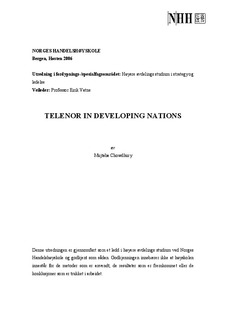| dc.description.abstract | Telenor was a state control telecom company. Since the industry were being
deregulated and liberalised in Europe and especially in Norway during the 90’s,
it was and is still experiencing tough competition, where it is rotted. In addition,
the market for mobile in Norway is almost saturated, i.e. there is very low
growth if and until any additional useful service is added. However, the
telecomm industry all over the world is going through a rapid change coming
from deregulation (liberalisation & privatisation), and also from innovation of
mobile telephony technology such as GSM & GPRS. These two factors have
opened new opportunities for mobile service operators to engage in FDI. Seeing
the opportunity coming from opening markets and huge demand for mobile
telephony, Telenor has started to invest in a number of countries such as
Thailand, Malaysia, Pakistan, Bangladesh, Ukraine, Russia, Montenegro,
Austria etc, especially in mobile sector of telecom industry. Mainly using
Dunning’s OLI paradigm of FDI, I will analyse Telenor’s FDI focusing
particularly at the Grameen Mobile Phone of Bangladesh, where Telenor has
62% stake. | en |
